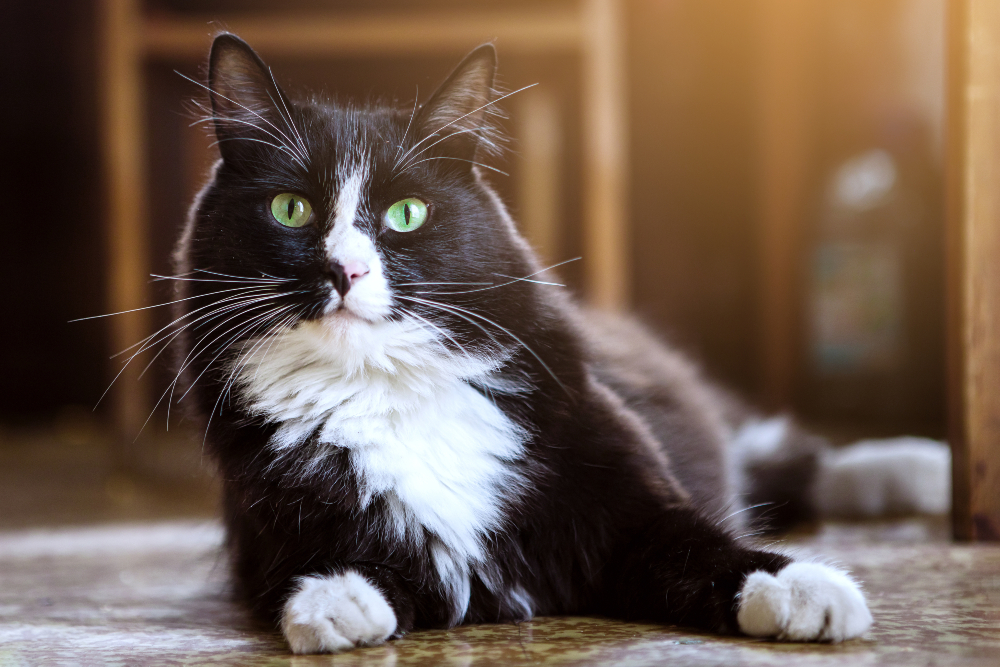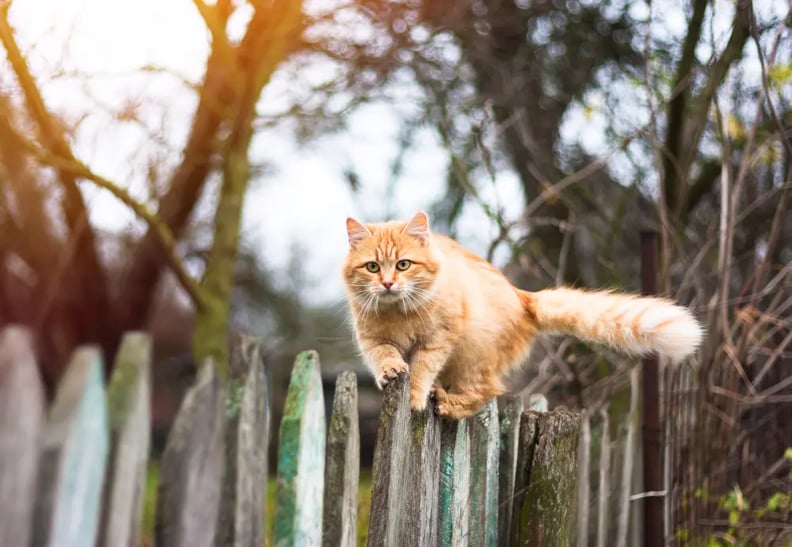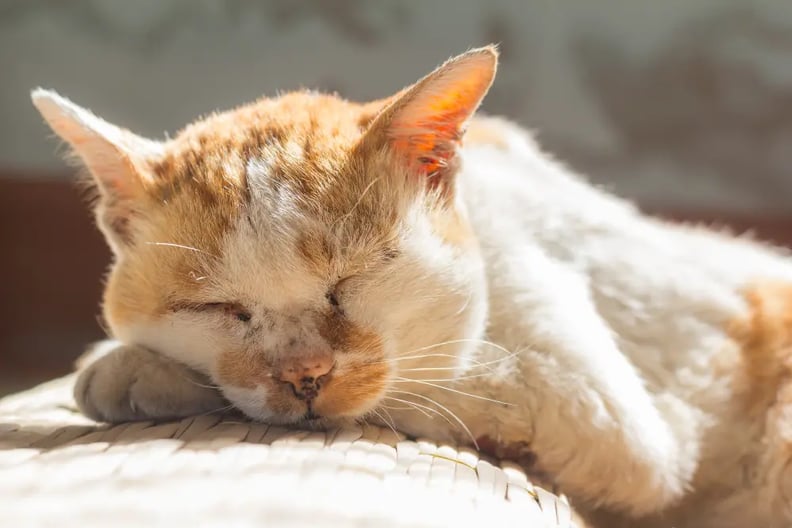
If we could will our cats to live forever, we would, but the reality is that cats have a limited lifespan. That's why it's important to make the best of the time we have with them. Find out how long do cats live and how you can keep them happy and healthy for as long as possible.
For thousands of years, cats have held an aura of mystery. They were once considered magical creatures in ancient Egypt, and that allure has persisted throughout the centuries.
Today, cats are treasured by pet owners for their unique personalities, playful antics, and mysterious attitudes. Furry felines quickly become beloved members of our family, so you might be wondering what the average lifespan of cats is so that you can make every day count.
If you are wondering how long a cat lives - remember that many things can impact the lifespan of a cat. The average lifespan of a cat is usually 13 to 14 years, but some cats live beyond that age.
On occasion, some cats live 18 to 20 years, with a small percentage even making it over 25 years with proper care and a little luck.
The Six Life Stages of a Cat
Many break a cat’s life into six life stages (yes, that kind of contradicts a cat’s nine lives). Meeting the needs of your furry friend at each of the cat’s life stages can help extend your cat’s life span.
Cats progress through six distinct life stages:
- Kitten (birth to six months old)
- Junior (six months to 2 years old)
- Adult (3–6 years old)
- Mature (7–10 years old)
- Senior (10–14 years old)
- Geriatric (15 years or older)
During the initial 24 months of a cat's life, they experience the most substantial growth. Your sweet kitten transitions from baby to toddler and onward to adulthood.
Throughout these life stages, you’ll need to ensure your cat receives proper nutrition and veterinary assistance when needed. Always watch for any subtle changes, such as a sudden disinterest in play, which could signify an underlying health concern.
Indoor and Outdoor Cat Lifespan

Perhaps the most crucial impact on how long your cat lives is whether the cat lives indoors or outdoors.
An indoor life versus an outdoor life can have a significant impact on a cat's lifespan due to the varying levels of safety, exposure to hazards, and overall quality of life associated with each lifestyle.
How Long Do Indoor Cats Live?
An indoor cat can easily live from 13 to 17 years. Cats that live exclusively indoors enjoy a safer environment. They are protected from outdoor dangers such as traffic, predators, harsh weather conditions, and the risk of diseases spread by other animals.
Indoor cats are less likely to get into fights or accidents that could lead to injuries. They also have a lower chance of encountering toxic substances, pesticides, and harmful plants.
With regular veterinary care, a controlled diet, and a safe, stimulating indoor environment, indoor cats often enjoy far longer lifespans compared to their outdoor counterparts.
How Long Do Outdoor Cats Live?
If you are wondering how long outdoor cats live, the sad reality is that an outdoor kitty will often have an average lifespan of only two to five years.
Outdoor cats face many dangers that can dramatically shorten their lifespan. The outdoor kitty is regularly exposed to dangers such as traffic accidents, encounters with aggressive animals, and exposure to extreme weather conditions.
Cats living outdoors are also more susceptible to infectious diseases, pests, and parasites due to interactions with other animals. Also, they are always at risk of ingesting toxic substances or plants while exploring their surroundings.
The hunting behaviour of outdoor cats can also lead to injuries and the consumption of prey that might carry diseases. While some outdoor cats may thrive in certain environments, the overall lifespan of outdoor cats tends to be shorter compared to indoor cats.
Pet owners who want to extend their cat’s lifespan should provide a complete indoor environment for their beloved kitty. If you want your cat to enjoy the outdoors, then consider the following options:
-
- Take your cat outdoors on a harness and leash for short, supervised walks.
- Use an outdoor cage where your cat can safely play.
- Build a screen room or a "catio" where your cat can enjoy the great outdoors without wandering loose.
Cat Age to Human Years
The common approach to converting cat age to human years involves understanding the differences in the rate of aging between cats and humans. While the "one cat year equals seven human years" rule is a popular estimate, it's not entirely accurate.
The progression of a cat’s age differs compared to that of a human. A more accurate way to convert cat age to human years considers the varying growth and maturity rates in cats.
Cats "age" the most in their first 2 years. Once they've fully matured into adulthood, they "age" slower and more consistently.
Let’s look at how many human years to cat years:
-
- Cat's First Year: Similar to about 15 human years
- Cat's Second Year: Roughly equivalent to 24 human years
- Cat's Third Year: About 28 human years
- Cat's Fourth Year: About 32 human years
- Cat's Fifth Year: Around 36 human years
After the second year, each additional cat year is approximately equivalent to four human years. However, it's important to note that this conversion is just an estimation, as the aging process can vary based on factors such as breed, genetics, and overall health.
Understanding the cat years to human years helps you meet your furry friend’s changing life stage needs.
When is a Cat Considered Old?

If you are wondering when a cat is old, then you should remember that the transition from adulthood to senior cat status does vary and depends on a variety of factors such as genetics, breed, and health.
Most cats are considered seniors when they reach seven to 10 years of age.
Cats are generally considered to be seniors when they reach the age of 7 to 10 years, though many cats don't actually start acting their old age until after 10. This transition from adulthood to senior status varies depending on factors such as breeding, genetics, and overall health.
Around the age of 7, cats may begin to experience subtle changes in their physical and behavioural characteristics associated with aging.
As your cat ages, you will notice the following:
-
- A decrease in activity level
- Weight changes
- Appetite changes
- Grooming may become less frequent.
- Health problems such as arthritis, dental problems or kidney disease often occur.
Regular veterinary check-ups become increasingly important as cats enter their senior years, as early detection and proper management of age-related health concerns can contribute to a longer lifespan.
How to Help Your Cat Live Longer
You want to help your cat live as long as possible, so you'll want to provide a healthy lifestyle to ensure a lifetime of health and happiness.
Below are a few ways you can help maintain your cat's health.
-
- Regular Veterinary Care: Maintain regular veterinary check-ups and an up-to-date vaccination schedule. Regular exams can catch potential health problems early.
- Balanced Nutrition: Feed your cat a high-quality, balanced diet that suits their age, health, and specific needs.
- Hydration: Provide your cat with access to fresh, clean water 24/7. Proper hydration supports overall health and helps prevent urinary issues. Invest in a pet water fountain to ensure your kitty is drinking enough.
- Maintain a Healthy Weight: Prevent obesity by monitoring your cat's weight and providing portion-controlled meals. Obesity can lead to various health problems.
- Enrichment and Play: Regularly engage your cat with interactive toys, scratching posts, and regular play sessions. Mental and physical stimulation contributes to your kitty’s physical and emotional well-being.
- Indoor Living: Consider keeping your cat indoors to protect them from outdoor hazards such as traffic, predators, and diseases. An indoor environment can extend their lifespan by keeping them safe and happy.
- Regular Grooming: Brush your cat's coat regularly to prevent matting and hairballs. Use flea and tick preventatives.
- Stress Management: Minimize stressors in your cat's environment, as stress can lead to health issues. Provide hiding spots and vertical spaces to help your cat feel secure and safe.
- Environmental Safety: Ensure your home is safe for your cat. Remove toxic plants, secure electrical cords and objects that could be ingested, and use only pet-safe cleaning products.
- Regular Exercise: Encourage physical activity by playing with your cat regularly. You might even want to bring in a second cat as a companion to increase your cat’s daily activity level. Exercise helps maintain muscle tone and weight.
- Early Detection: Be vigilant about changes in behaviour, appetite, or litter box habits. Promptly address any health concerns by immediately taking your kitty to the veterinarian at the first sign of a problem.
- Regular Dental Care: Dental health is crucial for overall well-being. Brush your cat's teeth regularly and discuss dental cleanings with your vet.
By following these guidelines and providing your cat with a loving, nurturing environment, you can help ensure they live a longer, healthier, and more fulfilling life by your side.
Frequently Asked Questions About Cat Age
When is a cat a senior?
If you are wondering when a cat is old, then remember that cats age at various times depending on breed, lifestyle and more. Most cats are considered seniors when they reach seven to 10 years old.
What factors influence a cat's lifespan?
Genetics, breed, diet, environment, lifelong veterinary care, and overall health play critical roles in determining a cat's lifespan.
How can I help my cat live a longer life?
Providing a balanced diet, regular veterinary care, a safe environment, mental and physical stimulation, and managing weight are the main ways to increase the cat’s life span.
Can cats of different breeds have different lifespans?
Yes, different cat breeds can have varying lifespans. Some breeds are predisposed to certain health issues that can impact their longevity.
What can I do to ensure my cat's senior years are healthy and comfortable?
Regular veterinary check-ups, age-appropriate diet, joint supplements, dental care, and providing a comfortable environment can contribute to a higher quality of life during your cat's senior years.
Does spaying or neutering affect a cat's lifespan?
Spaying or neutering your cat can have positive effects on their overall health and lifespan. Spayed females have a lower risk of certain reproductive cancers, while neutered males are less prone to certain behavioural issues, certain cancers, roaming, and injuries from fights.
.png?width=200&height=66&name=logo%20(1).png)





